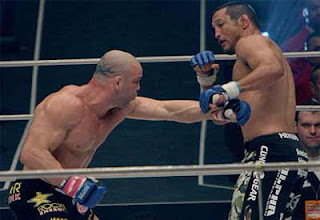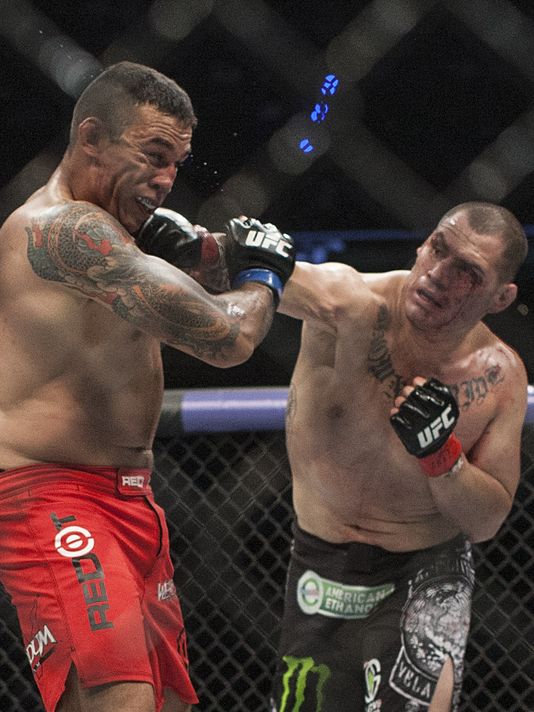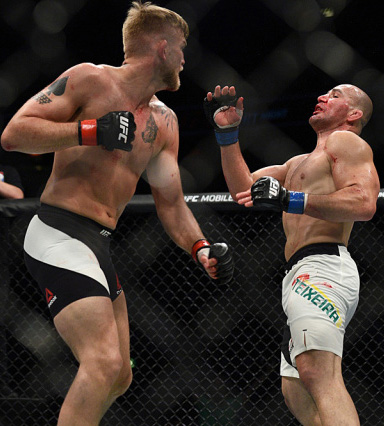When people point to the things that differentiate MMA and boxing, one major component that casual sports fans point to is the lack of structure. Guys just fight one another for one made up Alphabet Soup title or another, jumping up and down in weight classes in pursuit of big PPV fights. MMA, in particular the UFC,
is held up as the model that fight sports should emulate, what with their centralized authority, unified matchmaking, clear weight classes, and meaningful championships. At the high point of its popularity, it had five well-known champions who were viewed as the number one fighters in the world in their respective weight classes.
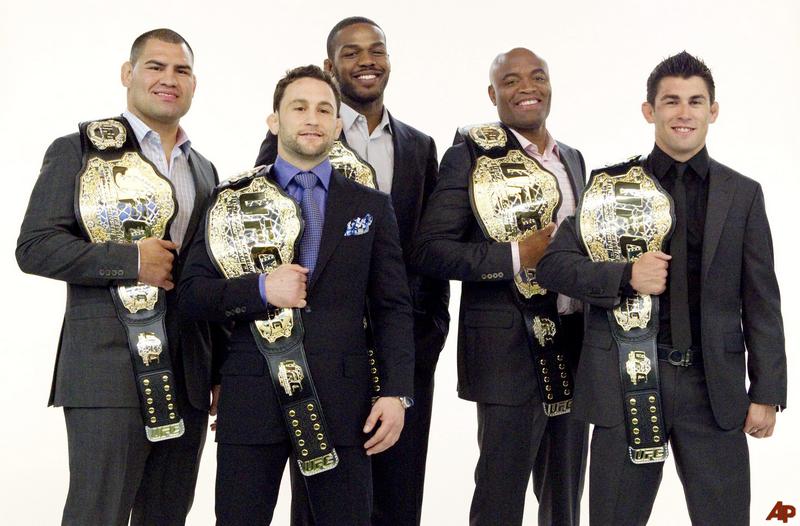 However, from that point, the pernicious idea of the “super fight” began to creep into the vernacular, as the dominance of BJ Penn, Georges St. Pierre, and Anderson Silva in particular started to worry fans who were used to paying for PPVs with uncertain results, and started to feel “ho hum” about another dominating performance by one of its pound-for-pound greats. Penn, who had previously competed and won a title at 170 pounds, had been more than willing to pursue a Champion vs. Champion path when he took on GSP at UFC 94, but after two losses to the welterweight champion, the attitude towards that fight was, at best, “not yet.” Anderson Silva, who had previously made successful forays to 205, refused to face the light heavyweight champion Lyoto Machida, as they were close friends, and even after Machida lost the belt, he refused to entertain the idea of stepping in front of his training partner. However, when it came to the welterweight champion, the idea of pushing St. Pierre into a super fight with Silva could not be shaken, no matter how many times GSP politely demurred.
However, from that point, the pernicious idea of the “super fight” began to creep into the vernacular, as the dominance of BJ Penn, Georges St. Pierre, and Anderson Silva in particular started to worry fans who were used to paying for PPVs with uncertain results, and started to feel “ho hum” about another dominating performance by one of its pound-for-pound greats. Penn, who had previously competed and won a title at 170 pounds, had been more than willing to pursue a Champion vs. Champion path when he took on GSP at UFC 94, but after two losses to the welterweight champion, the attitude towards that fight was, at best, “not yet.” Anderson Silva, who had previously made successful forays to 205, refused to face the light heavyweight champion Lyoto Machida, as they were close friends, and even after Machida lost the belt, he refused to entertain the idea of stepping in front of his training partner. However, when it came to the welterweight champion, the idea of pushing St. Pierre into a super fight with Silva could not be shaken, no matter how many times GSP politely demurred.
 As the years wore on, other superfights tantalized the fanbase, such as Featherweight Champion Jose Aldo stepping up to face then-lightweight champion Frankie Edgar (or even Edgar dropping down), or MMA’s new phenom Jon Jones either stepping up to heavyweight or having Silva step up to his weight class, despite both men having more than enough potential challengers to contest for their respective titles. When Anderson Silva stepped up to 205 to face Stephan Bonnar at UFC 153, fans’ appetites for pound-for-pound stars taking each other on, in any configuration, seemed to be at their highest point.
As the years wore on, other superfights tantalized the fanbase, such as Featherweight Champion Jose Aldo stepping up to face then-lightweight champion Frankie Edgar (or even Edgar dropping down), or MMA’s new phenom Jon Jones either stepping up to heavyweight or having Silva step up to his weight class, despite both men having more than enough potential challengers to contest for their respective titles. When Anderson Silva stepped up to 205 to face Stephan Bonnar at UFC 153, fans’ appetites for pound-for-pound stars taking each other on, in any configuration, seemed to be at their highest point.
It is against this backdrop that the current wave of UFC matchmaking has taken shape. Stretched to desperation by injuries to headliners, which forced at least one card cancellation, the UFC has grabbed ahold of any “money matchup” that it could. Fresh off a clear defeat to Anderson Silva at UFC 148, Chael Sonnen was plucked out of a perfectly legitimate introductory fight at 205 pounds to be programmed against Jones on the upcoming season of The Ultimate Fighter, with a guaranteed (yet wholly undeserved) title shot against Jones at UFC 159 as his reward. This of course was on the heels of Vitor Belfort getting an undeserved shot at Jones at UFC 152. Frank Edgar, long dogged by pressure to drop to featherweight, may have been enticed to do so by the promise that he would be granted an immediate shot at the champion., which he will cash in on at UFC 156. And on that same card, Rashad Evans, the world’s #2 Light Heavyweight, takes on Antonio Rogerio Nogueira, with recent reporting suggesting that he is angling for an immediate shot at Anderson Silva’s middleweight championship.
 To be clear, Silva vs. Rashad does make for an intriguing matchup. Rashad is very quick at 205, and possesses strength and wrestling technique that has allowed him to manhandle and dominate larger men and more credentialed wrestlers like Phil Davis. Given the way that Sonnen was able to use a relentless wrestling attack to nearly upset Silva, there is no doubt that the story could be told that Evans represents The Spider’s biggest test to date. And with Evans’ history of headlining big shows, there’s no doubt that Evans represents the best option for Silva box-office wise.
To be clear, Silva vs. Rashad does make for an intriguing matchup. Rashad is very quick at 205, and possesses strength and wrestling technique that has allowed him to manhandle and dominate larger men and more credentialed wrestlers like Phil Davis. Given the way that Sonnen was able to use a relentless wrestling attack to nearly upset Silva, there is no doubt that the story could be told that Evans represents The Spider’s biggest test to date. And with Evans’ history of headlining big shows, there’s no doubt that Evans represents the best option for Silva box-office wise.
However, the appeal of this fight is all about the two fighters involved. The middleweight championship is an afterthought. If Evans were to fall short in his shot at the gold, a return to his “home” weight class would be likely, as there is no shortage of big fights for him at 205, including other Jones victims like Machida, “Shogun” Rua, and (soon enough) Sonnen. Evans would not likely want to be stuck behind fighters like Chris Weidman, Luke Rockhold, “Jacare” Souza, Hector Lombard, and Belfort in the title queue, nor would matchups for him with those men be particularly lucrative immediately on the heels of a loss. For a fighter like Evans who wants big fights, matching up with a Yushin Okami or Michael Bisping (again) might be a fight between named guys, but would be a considerable step down from where he’d be at 205. And this is separate and apart from the question of how Evans would even look at 185 pounds. It’s 20 pounds lighter, Evans is getting up there in years (cutting weight gets harder the older fighters get), and Evans has never been known for endless cardio. Do we really want to encourage a sunken in and shriveled up Rashad Evans to make his first foray at a weight 20 pounds lighter against the best fighter in the world?
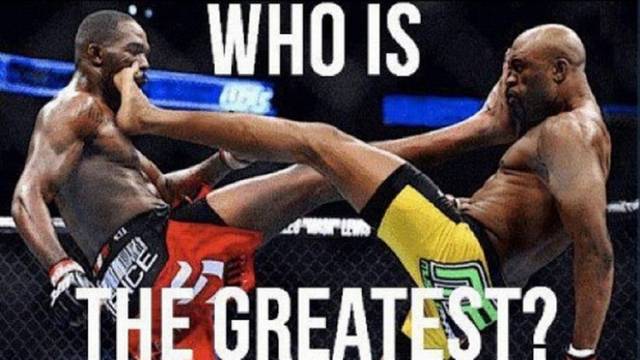 And again, Anderson Silva has competed against and excelled at 205 pounds. A strong argument can be made that he should be ranked among the Top 10 fighters there, having finished both Forrest Griffin and Stephan Bonnar, and with his speed advantages and devastating instant KO striking. Fans have been clamouring to see Silva step up to face Jon Jones — wouldn’t a fight against the #2 fighter at 205 pounds be the next best thing? Is it any less of a super fight if it happens at Evans’ natural weight class?
And again, Anderson Silva has competed against and excelled at 205 pounds. A strong argument can be made that he should be ranked among the Top 10 fighters there, having finished both Forrest Griffin and Stephan Bonnar, and with his speed advantages and devastating instant KO striking. Fans have been clamouring to see Silva step up to face Jon Jones — wouldn’t a fight against the #2 fighter at 205 pounds be the next best thing? Is it any less of a super fight if it happens at Evans’ natural weight class?
 In fact, the argument can be made that, from a business standpoint, letting Silva relinquish the middleweight championship, in pursuit of whatever the super fight du jour might be, could end up being the best course of action for the rest of his career. The aforementioned middleweight contenders, none of whom are ready for a fight with Anderson, would all be intriguing opponents for each other, and if Anderson were to take on Evans in the summer, it will have been a year since he defended the title. Whether he vacates the title, or the UFC chooses to go the Interim Championship route, the groundwork would be more than set for perhaps a Chris Weidman vs. Luke Rockhold fight to crown a new champion at 185 pounds. And given that the talk of Silva vs. GSP and Silva vs. Jon Jones is not likely to go away anytime soon, those options would still remain for a victorious Spider. (Hell, Silva has talked about fighting at heavyweight in the past!)
In fact, the argument can be made that, from a business standpoint, letting Silva relinquish the middleweight championship, in pursuit of whatever the super fight du jour might be, could end up being the best course of action for the rest of his career. The aforementioned middleweight contenders, none of whom are ready for a fight with Anderson, would all be intriguing opponents for each other, and if Anderson were to take on Evans in the summer, it will have been a year since he defended the title. Whether he vacates the title, or the UFC chooses to go the Interim Championship route, the groundwork would be more than set for perhaps a Chris Weidman vs. Luke Rockhold fight to crown a new champion at 185 pounds. And given that the talk of Silva vs. GSP and Silva vs. Jon Jones is not likely to go away anytime soon, those options would still remain for a victorious Spider. (Hell, Silva has talked about fighting at heavyweight in the past!)
The argument can be made that Anderson Silva now transcends the middleweight championship, and doesn’t really need it to be a draw. However, there are a lot of middleweights who do. Rashad Evans is not one of them, because he’s not a middleweight. He is one of the best 205-pounders in the world, and better that Anderson Silva get the chance to solidify his pound-for-pound credentials one weight class up than defend his title against an undeserving challenger, in a fight that does nothing to benefit the middleweight division. Sure, there’s a lot of wrong matchmaking going on in Zuffa headquarters, but that doesn’t mean we should turn a blind eye to what’s right.
For a dissenting viewpoint, check out: Rashad Evans and the Case For An Immediate Middleweight Title Shot.


